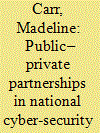|
|
|
Sort Order |
|
|
|
Items / Page
|
|
|
|
|
|
|
| Srl | Item |
| 1 |
ID:
149428


|
|
|
|
|
| Summary/Abstract |
In toll-road projects there is exogenous demand risk. Thus, the government may be required to provide a minimum-traffic guarantee to induce potential private partners to participate. The government must offer the most appropriate level of guarantee while also justifying this controversial fiscal policy tool to society. This study demonstrates the use of financial modeling, risk analysis, and economic evaluation in a toll-road project in Turkey, contributing to the narrowing of a capacity gap in the field. One criterion is proposed to produce a socially equitable guarantee level. This case study exemplifies the policy implications discussed in the conclusions, with a critical look at the public–private partnerships within the context of the neoliberal economic development theory.
|
|
|
|
|
|
|
|
|
|
|
|
|
|
|
|
| 2 |
ID:
187081


|
|
|
|
|
| Summary/Abstract |
In recent years, we have been able to observe the emergence and mainstreaming of an EU discourse on digital sovereignty, which highlights the importance of gaining back control of EU digital infrastructure and technological production, based on the EU's perceived loss of economic competitiveness, limited capacity to innovate, high degree of dependence on foreign digital infrastructures and service providers and, related to all these factors, difficulty in providing EU citizens with a high level of cybersecurity. Bearing in mind that a considerable percentage of these infrastructures and service providers are under private sector control, the present article asks how this sovereignty discourse conceptualises the role of the private sector in EU cybersecurity. Drawing from a Regulatory Capitalism theoretical model, this article proposes that the EU has instead entered a Regulatory Mercantilist phase where it seeks to reassert its control over cyberspace, impose digital borders, accumulate data wealth and reduce its dependence on external private sector actors whose values may not reflect those of the EU order. A new approach to cybersecurity is emerging, in which the non-EU private sector can be perceived as much of a threat as foreign powers, and from whom digital sovereignty must be secured.
|
|
|
|
|
|
|
|
|
|
|
|
|
|
|
|
| 3 |
ID:
155174


|
|
|
|
|
| Summary/Abstract |
Millions of households are pushed into poverty every year because of high outof-pocket
(OOP) expenditure on health care. Globally, each year more than 150
million people face financial catastrophe and around 100 million suffer destitution
due to OOP payments made for health care. More than 90 per cent of these people
reside in low-income countries. In South Asia, impoverishment due to health
payments is significant with at least 32 million people in India alone being pushed
into poverty annually due to OOP expenditures on health care. In most health care
systems in this region, the role of public spending on health and prepaid schemes,
such as tax and social insurance, is limited as is the extent of financial risk protection.
The problem is compounded by the large informal sector which is a major
challenge to attaining universal health coverage in South Asian countries.
Recent literature points to the role of public–private partnerships (PPP) in
health care as a viable solution for ensuring equitable access to health care especially
for the poor. This article seeks to review the major components of health
care financing and reform including financial risk protection, resource generation
and pooling, and PPPs in procurement and payment in South Asia. It identifies
key lessons across the health financing systems of Asian countries that
have attempted to reduce dependence on OOP expenditures, expanded health
service delivery and increased pooled health financing mechanisms. It analyses
the role and importance of PPPs in mitigating the impoverishing effects of OOP
health expenditure in South Asia.
|
|
|
|
|
|
|
|
|
|
|
|
|
|
|
|
| 4 |
ID:
147446


|
|
|
|
|
| Summary/Abstract |
While public–private partnerships (PPPs) have become an increasingly popular approach in both developed and developing countries, very little is known about whether or not PPPs are more efficient than pure-public or pure-private modes. Building on some recent work studying PPP issues this paper improves the understanding of public–private capital structures, provides some theoretical considerations as well as empirical evidence that private participation affects PPPs cost through the knowledge-transfer effect and the cost-increase effect, and demonstrates a U-shaped relationship between the project costs and private shares. Empirical analysis also finds that the private shares in China's infrastructure PPPs are excessive, and BOT (build, operate, and transfer) projects, compared to other PPP types, are not efficient in China.
|
|
|
|
|
|
|
|
|
|
|
|
|
|
|
|
| 5 |
ID:
145264


|
|
|
|
|
| Summary/Abstract |
Despite its centrality in the national cyber security strategies of the US and the UK, the public–private partnership is a nebulous arrangement, which is especially problematic in the context of critical infrastructure protection. Privately owned and operated critical infrastructure that is regarded as a potential national security vulnerability raises questions about the allocation of responsibility and accountability in terms of cyber security. As with many aspects of cyber security, this issue is often discussed with little reference to previous scholarship that could provide conceptual scaffolding. This article draws on the extensive literature on public–private partnerships in order to assess the tensions and challenges of this arrangement in national cyber-security strategies. It finds that there is a serious disjuncture in expectations from both ‘partners’. The government regards privately owned and operated critical infrastructure as a key element of national security but is reluctant to claim a mandate to oversee network security. At the same time, the private sector is not inclined to accept responsibility or liability for national cyber security. This challenge for governments to manage national cyber security raises questions about how well equipped these states are to promote their own security in the information age. Acknowledging the flaws in the ‘partnership’ is an essential step towards addressing them.
|
|
|
|
|
|
|
|
|
|
|
|
|
|
|
|
| 6 |
ID:
157976


|
|
|
|
|
| Summary/Abstract |
The governance of cyber-security risks is seen as increasingly important to the security of the nation. However, cyber-security risks are characterized by a fundamental uncertainty, which poses a great challenge to their governance and calls for new modes of organizing security politics. Public–private partnerships (PPPs) are often seen as the answer to this challenge by enhancing flexibility and robustness through knowledge-sharing. Engaging with the literature on PPPs and the Danish practice on cyber security, we show how PPPs involve controversies over different threat realities of cyber security. This plays out as controversies over what is considered threatened, the scope of the issue and the kind of expertise to be mobilized. Arguing that PPPs on security are not defined narrowly by short-sighted strategic self-interest but also loyalty and commitment, we suggest that the innovative potential of such PPPs lie not in a possible consensus on a common purpose and threat reality, but in the ability to embrace divergent definitions and approaches to cyber security. Acknowledging the corporate interests and loyalty, we suggest a move towards the notion of partnering through dissent.
|
|
|
|
|
|
|
|
|
|
|
|
|
|
|
|
|
|
|
|
|